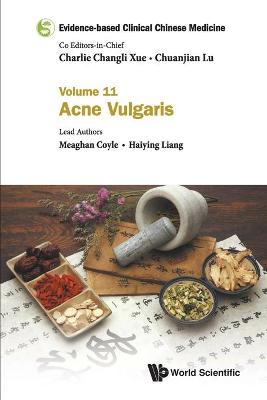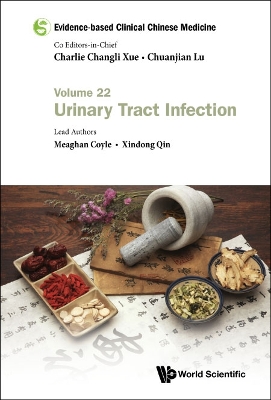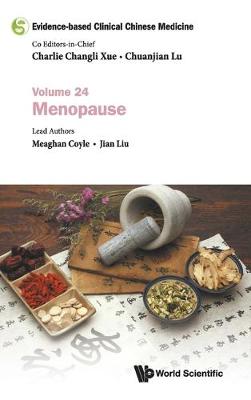Evidence-based Clinical Chinese Medicine
5 primary works
Book 11
Evidence-based Clinical Chinese Medicine - Volume 11: Acne Vulgaris
by Meaghan Coyle and Haiying Liang
Published 16 May 2019
The eleventh volume in the Evidence-based Clinical Chinese Medicine series is a must read for Chinese medicine practitioners interested in dermatology. Using a 'whole evidence' approach, this book aims to provide an analysis of the management of acne vulgaris with Chinese and integrative medicine.This book describes the understanding and management of acne vulgaris with conventional medicine and Chinese medicine. Chinese medicine treatments used in past eras are analysed through data mining of classical Chinese medicine books. Several treatments are identified that are still used in contemporary clinical practice. Attention is then turned to evaluating the current state of evidence from clinical studies using an evidence-based medicine approach. Scientific techniques are employed to evaluate the results from studies of Chinese herbal medicine, acupuncture and other Chinese medicine therapies. The findings from these reviews are discussed in terms of the implications for clinical practice and research.Chinese medicine practitioners and students can use this book as a desktop reference to support clinical decision making. Having ready access to the current state of evidence for herbal formulas and acupuncture treatments allows practitioners to be confident in providing evidence-based health care.This book provides an innovative 'whole evidence' approach to the management of acne vulgaris. Multiple types of evidence from different sources are reviewed and synthesized to provide a summary of the available evidence.Interventions, including oral and topical Chinese herbal medicine, body and ear acupuncture and combinations of these therapies, are evaluated for their effect on acne lesion count and severity, and impact on health-related quality of life.Chinese medicine treatments that have been frequently used in clinical studies provide guidance for patient care. This book links formulas, herbs and acupuncture points with treatment efficacy, providing the reader with potential for creating new formulas.The editors of this series are internationally recognised, well-respected leaders in the field of Chinese medicine and evidence-based medicine with strong track records in research.
Book 16
Evidence-based Clinical Chinese Medicine - Volume 16: Atopic Dermatitis
by Meaghan Coyle and Junfeng Liu
Published 31 October 2019
The authors start the book with overviews of the understanding and management of atopic dermatitis in conventional and Chinese medicine. They then review how atopic dermatitis was treated with herbal medicine and other Chinese medicine therapies in past eras, and highlight the treatments that continue to be used in contemporary clinical practice.The authors use evidence-based medicine principles and scientific techniques to review the current state of evidence from clinical studies of Chinese herbal medicine, acupuncture, and combinations of these therapies. Attention is given to studies evaluating these therapies used as an adjunct to conventional treatments. The authors summarise the results of analyses of clinical outcomes and discuss their implications for clinical practice of Chinese medicine and for future research.This book will inform clinicians and students of Chinese and integrative medicine of the current state of evidence from contemporary and traditional sources. Clinicians can refer to the herbal formulas and acupuncture treatments described in this book to make evidence-based decisions in patient care.The following features mark the importance of this book in the field:
Book 22
Evidence-based Clinical Chinese Medicine - Volume 22: Urinary Tract Infection
by Meaghan Coyle and Xindong Qin
Published 19 October 2020
Urinary tract infection is a common clinical condition with a significant health burden. This latest volume, Vol. 22 in the Evidence-based Clinical Chinese Medicine series, uses a 'whole evidence' approach to summarise management of urinary tract infection with Chinese medicine. The first chapter provides an overview of the clinical presentation, diagnosis and treatment with conventional medicine. The conceptualisation of urinary tract infection in both contemporary and classical Chinese medicine literature is reviewed and analysed. Attention is then turned to the evidence from clinical studies. Systematic reviews, using internationally accepted scientific methods, describe the treatments tested in clinical studies and the effects of Chinese herbal medicine, acupuncture and related therapies, and combinations of these therapies for urinary tract infection. The potential mechanisms of action for some of the key herbs are summarised, based on analysis of experimental studies. The final chapter summarises the current state of evidence and offers suggestions for contemporary clinical practice and future research.This book is a handy desktop reference for both clinicians and students of Chinese and integrative medicine. It provides a comprehensive synthesis of both traditional and contemporary knowledge that can inform clinical decision-making.This book provides an in-depth analysis of Chinese medicine management of urinary tract infection.
Book 24
Evidence-based Clinical Chinese Medicine - Volume 24: Menopause
by Meaghan Coyle and Jian Liu
Published 9 November 2020
Menopausal symptoms can significantly reduce women's quality of life, and may last for several years. Women who seek relief from symptoms often turn to complementary therapies, including Chinese medicine. The latest in the Evidence-based Clinical Chinese Medicine series uses a 'whole evidence' approach to summarise the management of menopausal symptoms with Chinese medicine. The first chapter describes the conventional medicine understanding of menopause, including common signs and symptoms, diagnosis and treatment. The Chinese medicine conceptualisation of menopause, both in contemporary and classical literature, is reviewed and discussed.The evidence from clinical studies is reviewed using internationally accepted scientific methods. Systematic reviews describe the treatments used in clinical studies, and analyse the effectiveness of Chinese herbal medicines, acupuncture and related therapies, other Chinese medicine therapies, and combinations of Chinese medicine therapies. Experimental studies that describe the potential mechanisms of action of key herbs are summarised. The final chapter synthesises the current evidence and offers suggestions for contemporary clinical practice and future research.This book is a handy desktop reference for both clinicians and students of Chinese and integrative medicine. It provides a comprehensive synthesis of both traditional and contemporary knowledge that can inform clinical decision-making.
Book 28
Evidence-based Clinical Chinese Medicine - Volume 28: Endometriosis
by Meaghan Coyle and Yongxia Wang
Published 28 November 2021
Endometriosis is a chronic health complaint that is experienced by up to 10% of women of reproductive age. Endometriosis results in significant psychological and financial burden. Surgical and pharmacological management can alleviate symptoms, but recurrence of endometriosis within one year is common. Many women use complementary and alternative therapies when the response to conventional medical treatments is inadequate.The latest book in the Evidence-based Clinical Chinese Medicine series uses a 'whole evidence' approach to summarise the management of endometriosis with Chinese medicine treatments. The current understanding of endometriosis - including symptoms, diagnosis and treatment - is summarised from conventional medicine and Chinese medicine perspectives. Next, a systematic approach is used to understand how endometriosis was treated with Chinese medicine in past eras.Internationally recognised scientific methods are used to identify and evaluate the clinical evidence for Chinese herbal medicine, acupuncture and related therapies. The potential mechanisms of herbal medicines are identified from experimental studies. The final chapter synthesises the evidence from the different literature sources and offers suggestions for contemporary clinical practice and future research.This book is a handy desktop reference for both clinicians and students of Chinese and integrative medicine. It provides a comprehensive synthesis of both traditional and contemporary knowledge that can inform clinical decision-making.




